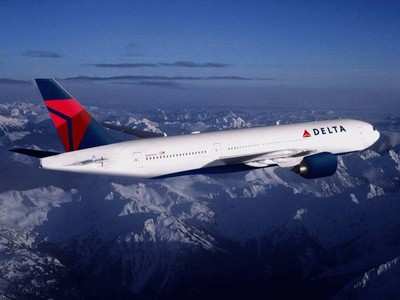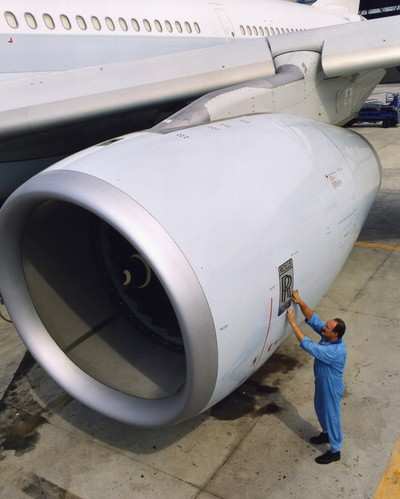Rolls-Royce Says Redesigned Component Is Under Development
 Following two engine thrust rollback events on Boeing 777
aircraft powered by Rolls-Royce engines, the National
Transportation Safety Board issued a pair of urgent safety
recommendations Wednesday to the FAA and EASA, calling for the
redesign of a Rolls-Royce engine component -- said to already be in
development -- and the prompt installation of that redesigned part
once it is approved.
Following two engine thrust rollback events on Boeing 777
aircraft powered by Rolls-Royce engines, the National
Transportation Safety Board issued a pair of urgent safety
recommendations Wednesday to the FAA and EASA, calling for the
redesign of a Rolls-Royce engine component -- said to already be in
development -- and the prompt installation of that redesigned part
once it is approved.
Specifically, the NTSB recommends the FAA require Rolls-Royce
redesign the RB211 Trent 800 series engine fuel/oil heat exchanger
(FOHE) such that ice accumulation on the face of the FOHE will not
restrict fuel flow to the extent that the ability to achieve
commanded thrust is reduced. Once the fuel/oil heat exchanger
(FOHE) is redesigned and approved by certification authorities,
NTSB says the FAA should require operators of Boeing 777-200
airplanes powered by Rolls Royce RB211 Trent 800 series engines
install the redesigned FOHE at the next scheduled maintenance
opportunity or within 6 months after the revised FOHE design has
been certificated, whichever comes first.
These recommendations are being issued in response to the
findings in two investigations -- an accident and an incident --
involving engine thrust rollbacks on Boeing 777-200ER airplanes
powered by Rolls-Royce RB211 Trent 800 Series engines. In both
cases, a build-up of ice (from water normally present in all jet
fuel) on the fuel/oil heat exchanger (FOHE) restricted the flow of
fuel to the engine, resulting in an uncommanded engine
rollback.
The first event, which is still being investigated by the UK's
Air Accidents Investigation Branch, occurred on January 17, 2008,
when a Boeing 777 experienced a dual engine rollback on final
approach and
crashed short of the runway at London's Heathrow
International Airport. One passenger was seriously
injured, eight passengers and four of the flight crew sustained
minor injuries; the airplane was substantially damaged.
The second event occurred on November 26, 2008, when a Delta Air Lines Boeing 777 experienced a
single engine rollback during cruise flight over
Montana while en route from Shanghai to Atlanta. Normal operations
resumed after the flight crew followed Boeing's published procedure
to recover engine performance; the airplane landed safely in
Atlanta.

Testing in support of the UK accident investigation led Boeing
to develop procedures to help prevent ice accumulation, and to
recover thrust in cases of ice blockage. As more information from
the Delta rollback event was developed, Boeing modified the
procedures, which became the basis of
an airworthiness directive issued by the Federal Aviation
Administration last week.
The NTSB says while those procedures may reduce the risk of a
rollback in one or both engines due to FOHE ice blockage, they add
complexity to flight crew operations, and the level of risk
reduction is not well established. And because the recovery
procedure requires a descent, the aircraft may be exposed to other
risks such as rising terrain or hazardous weather, or the inability
to achieve maximum thrust during a critical phase of flight, such
as during a missed approach.
Because of these hazards, the Safety Board determined the only
acceptable solution to this safety vulnerability is a redesigned
FOHE that would eliminate the potential of ice build-up. On
February 23, 2009, Rolls-Royce indicated that a redesign of the
FOHE was underway, and that they anticipated the redesign to be
tested, certified and ready for installation within 12 months.

"With two of these rollback events occurring within a year, we
believe that there is a high probability of something similar
happening again," said NTSB Acting Chairman Mark Rosenker. "We are
encouraged to see that Rolls-Royce is already working on a
redesign, and we are confident that with the FAA and EASA (European
Aviation Safety Agency) overseeing the process, this flight safety
issue -- even one as complex as this -- will be successfully and
expeditiously resolved."
 ANN's Daily Aero-Term (04.26.24): DETRESFA (Distress Phrase)
ANN's Daily Aero-Term (04.26.24): DETRESFA (Distress Phrase) ANN's Daily Aero-Linx (04.26.24)
ANN's Daily Aero-Linx (04.26.24) Airborne 04.22.24: Rotor X Worsens, Airport Fees 4 FNB?, USMC Drone Pilot
Airborne 04.22.24: Rotor X Worsens, Airport Fees 4 FNB?, USMC Drone Pilot Airborne 04.24.24: INTEGRAL E, Elixir USA, M700 RVSM
Airborne 04.24.24: INTEGRAL E, Elixir USA, M700 RVSM Airborne-NextGen 04.23.24: UAVOS UVH 170, magni650 Engine, World eVTOL Directory
Airborne-NextGen 04.23.24: UAVOS UVH 170, magni650 Engine, World eVTOL Directory





